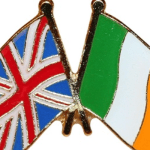The European Commission has set out the new rules for taking pets abroad that will apply from 1 January 2021.
Britons wanting to take their pets to Northern Ireland or abroad to the EU next year will have to apply for an animal health certificate under new post-Brexit rules.
However, more stringent checks will not be needed following an agreement with Brussels, the UK government announced on Wednesday.
Britons will continue to be able to take their pets to EU countries with them and return to the UK again until the end of the Brexit transition on December 31 if the usual conditions are met.
These include having a pet passport, having your pet microchipped and having your pet vaccinated against rabies.
However, from 1 January, pet passports will no longer be valid for trips to either the EU or Northern Ireland and those travelling with their cats, dogs or ferrets will have to use an animal health certificate instead.
The government says this is the only new requirement for post-Brexit travel to the EU with pets or assistance dogs, after the UK was granted Part 2 listed status by the European Commission under the bloc’s pet travel scheme.
The full requirements for taking pets to the EU or Northern Ireland for the first time after 1 January are:
-You must have your dog, cat or ferret microchipped.
-Vaccinate your dog, cat or ferret against rabies
-Your pet must be at least 12 weeks old before it can be vaccinated.
-Wait 21 days after the primary vaccination before travel.
-Treat your dog against tapeworm 24-120 hours before arriving, if you are travelling to a tapeworm-free country
-Visit your vet to get an animal health certificate for your pet, no more than 10 days before travel to the EU.
An animal health certificate needs to be signed by a vet after they have been given proof of a pet’s microchipping date and vaccination history.
The certificate will be valid for 10 days after the date of issue for entry into the EU or Northern Ireland, onward travel within the EU or Northern Ireland for four months after the date of issue, and re-entry to Great Britain for four months after the date of issue.
The European Commission has set out the new rules for taking pets abroad that will apply from 1 January 2021.
Britons wanting to take their pets to Northern Ireland or abroad to the EU next year will have to apply for an animal health certificate under new post-Brexit rules.
However, more stringent checks will not be needed following an agreement with Brussels, the UK government announced on Wednesday.
Britons will continue to be able to take their pets to EU countries with them and return to the UK again until the end of the Brexit transition on December 31 if the usual conditions are met.
These include having a pet passport, having your pet microchipped and having your pet vaccinated against rabies.
However, from 1 January, pet passports will no longer be valid for trips to either the EU or Northern Ireland and those travelling with their cats, dogs or ferrets will have to use an animal health certificate instead.
The government says this is the only new requirement for post-Brexit travel to the EU with pets or assistance dogs, after the UK was granted Part 2 listed status by the European Commission under the bloc’s pet travel scheme.
The full requirements for taking pets to the EU or Northern Ireland for the first time after 1 January are:
-You must have your dog, cat or ferret microchipped.
-Vaccinate your dog, cat or ferret against rabies
-Your pet must be at least 12 weeks old before it can be vaccinated.
-Wait 21 days after the primary vaccination before travel.
-Treat your dog against tapeworm 24-120 hours before arriving, if you are travelling to a tapeworm-free country
-Visit your vet to get an animal health certificate for your pet, no more than 10 days before travel to the EU.
An animal health certificate needs to be signed by a vet after they have been given proof of a pet’s microchipping date and vaccination history.
The certificate will be valid for 10 days after the date of issue for entry into the EU or Northern Ireland, onward travel within the EU or Northern Ireland for four months after the date of issue, and re-entry to Great Britain for four months after the date of issue.
The European Commission has set out the new rules for taking pets abroad that will apply from 1 January 2021.
Britons wanting to take their pets to Northern Ireland or abroad to the EU next year will have to apply for an animal health certificate under new post-Brexit rules.
However, more stringent checks will not be needed following an agreement with Brussels, the UK government announced on Wednesday.
Britons will continue to be able to take their pets to EU countries with them and return to the UK again until the end of the Brexit transition on December 31 if the usual conditions are met.
These include having a pet passport, having your pet microchipped and having your pet vaccinated against rabies.
However, from 1 January, pet passports will no longer be valid for trips to either the EU or Northern Ireland and those travelling with their cats, dogs or ferrets will have to use an animal health certificate instead.
The government says this is the only new requirement for post-Brexit travel to the EU with pets or assistance dogs, after the UK was granted Part 2 listed status by the European Commission under the bloc’s pet travel scheme.
The full requirements for taking pets to the EU or Northern Ireland for the first time after 1 January are:
-You must have your dog, cat or ferret microchipped.
-Vaccinate your dog, cat or ferret against rabies
-Your pet must be at least 12 weeks old before it can be vaccinated.
-Wait 21 days after the primary vaccination before travel.
-Treat your dog against tapeworm 24-120 hours before arriving, if you are travelling to a tapeworm-free country
-Visit your vet to get an animal health certificate for your pet, no more than 10 days before travel to the EU.
An animal health certificate needs to be signed by a vet after they have been given proof of a pet’s microchipping date and vaccination history.
The certificate will be valid for 10 days after the date of issue for entry into the EU or Northern Ireland, onward travel within the EU or Northern Ireland for four months after the date of issue, and re-entry to Great Britain for four months after the date of issue.
The European Commission has set out the new rules for taking pets abroad that will apply from 1 January 2021.
Britons wanting to take their pets to Northern Ireland or abroad to the EU next year will have to apply for an animal health certificate under new post-Brexit rules.
However, more stringent checks will not be needed following an agreement with Brussels, the UK government announced on Wednesday.
Britons will continue to be able to take their pets to EU countries with them and return to the UK again until the end of the Brexit transition on December 31 if the usual conditions are met.
These include having a pet passport, having your pet microchipped and having your pet vaccinated against rabies.
However, from 1 January, pet passports will no longer be valid for trips to either the EU or Northern Ireland and those travelling with their cats, dogs or ferrets will have to use an animal health certificate instead.
The government says this is the only new requirement for post-Brexit travel to the EU with pets or assistance dogs, after the UK was granted Part 2 listed status by the European Commission under the bloc’s pet travel scheme.
The full requirements for taking pets to the EU or Northern Ireland for the first time after 1 January are:
-You must have your dog, cat or ferret microchipped.
-Vaccinate your dog, cat or ferret against rabies
-Your pet must be at least 12 weeks old before it can be vaccinated.
-Wait 21 days after the primary vaccination before travel.
-Treat your dog against tapeworm 24-120 hours before arriving, if you are travelling to a tapeworm-free country
-Visit your vet to get an animal health certificate for your pet, no more than 10 days before travel to the EU.
An animal health certificate needs to be signed by a vet after they have been given proof of a pet’s microchipping date and vaccination history.
The certificate will be valid for 10 days after the date of issue for entry into the EU or Northern Ireland, onward travel within the EU or Northern Ireland for four months after the date of issue, and re-entry to Great Britain for four months after the date of issue.
The European Commission has set out the new rules for taking pets abroad that will apply from 1 January 2021.
Britons wanting to take their pets to Northern Ireland or abroad to the EU next year will have to apply for an animal health certificate under new post-Brexit rules.
However, more stringent checks will not be needed following an agreement with Brussels, the UK government announced on Wednesday.
Britons will continue to be able to take their pets to EU countries with them and return to the UK again until the end of the Brexit transition on December 31 if the usual conditions are met.
These include having a pet passport, having your pet microchipped and having your pet vaccinated against rabies.
However, from 1 January, pet passports will no longer be valid for trips to either the EU or Northern Ireland and those travelling with their cats, dogs or ferrets will have to use an animal health certificate instead.
The government says this is the only new requirement for post-Brexit travel to the EU with pets or assistance dogs, after the UK was granted Part 2 listed status by the European Commission under the bloc’s pet travel scheme.
The full requirements for taking pets to the EU or Northern Ireland for the first time after 1 January are:
-You must have your dog, cat or ferret microchipped.
-Vaccinate your dog, cat or ferret against rabies
-Your pet must be at least 12 weeks old before it can be vaccinated.
-Wait 21 days after the primary vaccination before travel.
-Treat your dog against tapeworm 24-120 hours before arriving, if you are travelling to a tapeworm-free country
-Visit your vet to get an animal health certificate for your pet, no more than 10 days before travel to the EU.
An animal health certificate needs to be signed by a vet after they have been given proof of a pet’s microchipping date and vaccination history.
The certificate will be valid for 10 days after the date of issue for entry into the EU or Northern Ireland, onward travel within the EU or Northern Ireland for four months after the date of issue, and re-entry to Great Britain for four months after the date of issue.
The European Commission has set out the new rules for taking pets abroad that will apply from 1 January 2021.
Britons wanting to take their pets to Northern Ireland or abroad to the EU next year will have to apply for an animal health certificate under new post-Brexit rules.
However, more stringent checks will not be needed following an agreement with Brussels, the UK government announced on Wednesday.
Britons will continue to be able to take their pets to EU countries with them and return to the UK again until the end of the Brexit transition on December 31 if the usual conditions are met.
These include having a pet passport, having your pet microchipped and having your pet vaccinated against rabies.
However, from 1 January, pet passports will no longer be valid for trips to either the EU or Northern Ireland and those travelling with their cats, dogs or ferrets will have to use an animal health certificate instead.
The government says this is the only new requirement for post-Brexit travel to the EU with pets or assistance dogs, after the UK was granted Part 2 listed status by the European Commission under the bloc’s pet travel scheme.
The full requirements for taking pets to the EU or Northern Ireland for the first time after 1 January are:
-You must have your dog, cat or ferret microchipped.
-Vaccinate your dog, cat or ferret against rabies
-Your pet must be at least 12 weeks old before it can be vaccinated.
-Wait 21 days after the primary vaccination before travel.
-Treat your dog against tapeworm 24-120 hours before arriving, if you are travelling to a tapeworm-free country
-Visit your vet to get an animal health certificate for your pet, no more than 10 days before travel to the EU.
An animal health certificate needs to be signed by a vet after they have been given proof of a pet’s microchipping date and vaccination history.
The certificate will be valid for 10 days after the date of issue for entry into the EU or Northern Ireland, onward travel within the EU or Northern Ireland for four months after the date of issue, and re-entry to Great Britain for four months after the date of issue.
The European Commission has set out the new rules for taking pets abroad that will apply from 1 January 2021.
Britons wanting to take their pets to Northern Ireland or abroad to the EU next year will have to apply for an animal health certificate under new post-Brexit rules.
However, more stringent checks will not be needed following an agreement with Brussels, the UK government announced on Wednesday.
Britons will continue to be able to take their pets to EU countries with them and return to the UK again until the end of the Brexit transition on December 31 if the usual conditions are met.
These include having a pet passport, having your pet microchipped and having your pet vaccinated against rabies.
However, from 1 January, pet passports will no longer be valid for trips to either the EU or Northern Ireland and those travelling with their cats, dogs or ferrets will have to use an animal health certificate instead.
The government says this is the only new requirement for post-Brexit travel to the EU with pets or assistance dogs, after the UK was granted Part 2 listed status by the European Commission under the bloc’s pet travel scheme.
The full requirements for taking pets to the EU or Northern Ireland for the first time after 1 January are:
-You must have your dog, cat or ferret microchipped.
-Vaccinate your dog, cat or ferret against rabies
-Your pet must be at least 12 weeks old before it can be vaccinated.
-Wait 21 days after the primary vaccination before travel.
-Treat your dog against tapeworm 24-120 hours before arriving, if you are travelling to a tapeworm-free country
-Visit your vet to get an animal health certificate for your pet, no more than 10 days before travel to the EU.
An animal health certificate needs to be signed by a vet after they have been given proof of a pet’s microchipping date and vaccination history.
The certificate will be valid for 10 days after the date of issue for entry into the EU or Northern Ireland, onward travel within the EU or Northern Ireland for four months after the date of issue, and re-entry to Great Britain for four months after the date of issue.
The European Commission has set out the new rules for taking pets abroad that will apply from 1 January 2021.
Britons wanting to take their pets to Northern Ireland or abroad to the EU next year will have to apply for an animal health certificate under new post-Brexit rules.
However, more stringent checks will not be needed following an agreement with Brussels, the UK government announced on Wednesday.
Britons will continue to be able to take their pets to EU countries with them and return to the UK again until the end of the Brexit transition on December 31 if the usual conditions are met.
These include having a pet passport, having your pet microchipped and having your pet vaccinated against rabies.
However, from 1 January, pet passports will no longer be valid for trips to either the EU or Northern Ireland and those travelling with their cats, dogs or ferrets will have to use an animal health certificate instead.
The government says this is the only new requirement for post-Brexit travel to the EU with pets or assistance dogs, after the UK was granted Part 2 listed status by the European Commission under the bloc’s pet travel scheme.
The full requirements for taking pets to the EU or Northern Ireland for the first time after 1 January are:
-You must have your dog, cat or ferret microchipped.
-Vaccinate your dog, cat or ferret against rabies
-Your pet must be at least 12 weeks old before it can be vaccinated.
-Wait 21 days after the primary vaccination before travel.
-Treat your dog against tapeworm 24-120 hours before arriving, if you are travelling to a tapeworm-free country
-Visit your vet to get an animal health certificate for your pet, no more than 10 days before travel to the EU.
An animal health certificate needs to be signed by a vet after they have been given proof of a pet’s microchipping date and vaccination history.
The certificate will be valid for 10 days after the date of issue for entry into the EU or Northern Ireland, onward travel within the EU or Northern Ireland for four months after the date of issue, and re-entry to Great Britain for four months after the date of issue.














